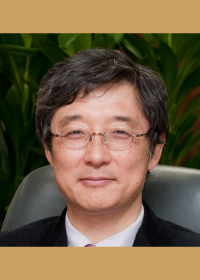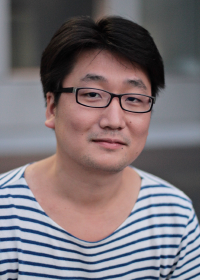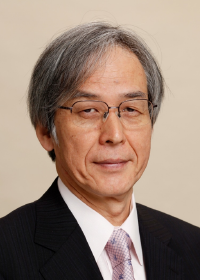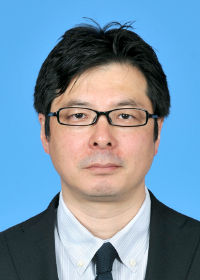Academia
- TOP
- Academia
-

University of Tokyo, Institute of Industrial ScienceAssociate professorKazuo Oki
After finishing the doctoral course at University of Tsukuba Graduate School of Social Engineering, Oki transferred to the National Institute for Environmental Studies, Gunma University Faculty of Engineering, and to University of Tokyo Graduate School of Agricultural and Life Sciences. He currently works for the Institute of Industrial Science at the University of Tokyo. Along the way, he also studied abroad at the Joint Research Centre in Ispra, Italy, and was sent to work for the Cabinet Office, Council for Science and Technology for several years. His research always focused on the development of satellite remote sensing methods in the field of environment and agriculture, but recently, he has become interested in developing drone-based remote sensing method, a useful technology for agriculture. He hopes to contribute to establishing the field of food production technology through the integration of agriculture and engineering. Along with Maki, he manages and operates the Food Production Technology Study Group.
-

University of Miyazaki, Faculty of Regional InnovationLecturerTomohiro Kondo
Brief biography: Graduated from Kyoto University Graduate School of Agriculture (Doctoral degree in Agriculture). After working as a researcher at Kyoto University Graduate School of Agriculture, and University of Tokyo Graduate School of Agricultural and Life Sciences, he took his current position in 2015.
Expertise: Pomology (specializes in tropical and subtropical fruit trees)Role in the project:
Cultivation test of pecan nuts, cultivation management etc. in the garden -

University of Tokyo, Atmosphere and Ocean Research InstituteProfessorKatsufumi Sato
Professor of University of Tokyo, the Atmosphere and Ocean Research Institute. In 1995, Sato completed the doctoral course in Fisheries Science, Kyoto University Graduate School of Agriculture, PhD (Agriculture). Special researcher at the Japan Society for the Promotion of Science (1995), Assistant at the National Polar Research Institute (1997), Associate Professor of the University of Tokyo Ocean Research Institute (2004), and took the current position in 2014. From 1998 to 2000, he spent the winter season at Showa Station as a member of the 40th Antarctic Research Expedition. Specializes in ethology using bio-logging. As an expert on birds, he plans to participate in the research on agricultural application of unmanned aerial vehicles (drones).
-

Fukushima University, Agricultural ScienceEducational research organization project officeDaisuke Takada
Expertise: Pomology, Fukushima University Agricultural Science,
Educational research organization project office
From Himeji-shi in Hyogo prefecture, Takadsa studied fruit cultivation at Okayama University Faculty of Agriculture, acquired doctoral degree in agriculture, worked as Assistant Professor of Agriculture and Life Sciences, the University of Tokyo, and later took the current position.Study and investigation on annual management and optimization of cultivation of pecans, as well as implementation on actual cultivation. Cultivation test and tree investigation on selection of pecans suitable for Rikuzentakata.
-

University of Tokyo, Institute of Industrial ScienceProfessorTomonari Yashiro
Brief biography: Completed the doctoral course at the University of Tokyo Graduate school of architecture (Doctoral degree in engineering), worked for Ministry of Construction Building Research Institute, Musashi Institute of Technology Department of Architecture, University of Tokyo Graduate School of Civil Engineering, and took the current position in 2001.
Expertise: Sustainable Building, Building production and project management, Innovation management
Major literary works: Service Provider - Toshi Saisei no Shin Sangyo-ron (Single author), Kenchiku Mono Dukuri-ron - Architecture as “Architecture”(Co-author, Architectural Institute of Japan Award ), Innovation Management Process - Soshiki no kouzou Kara Kangaeru / University of Tokyo Press 2016 (Single author, Japan Institute of Certified Public Accountants Academic Award)
Role in project: Planning, design, construction and operation of Pecan Nuts related facilities in line with the reconstruction of Rikuzentakata-shi. -

Gifu University, Faculty of Applied Biological Sciences Assistant professorKeigo Noda
Completed the doctoral course at the University of Tokyo Graduate School of Agriculture and Life Sciences / Faculty of Agriculture (Doctoral degree in Agriculture) in 2010. Worked as a researcher at Ibaraki University Faculty of Agriculture for the collaboration of industry, government and academia in 2010, project researcher at University of Tokyo Institute of Industrial Science in 2011, and specially appointed assistant professor in 2012. From November 2016 to February 2017, Noda stayed at the Institute of Industrial Science Saint‐Simon laboratory at the University of Tokyo and engaged in establishing the observation system for local pecan gardens. He is the Assistant Professor of Gifu University Faculty of Applied Biological Sciences Since 2017. Research topics include urban-rural water environment in Southeast Asia, agriculture and environmental maintenance in the island areas, various problems related to irrigation and drainage in the Nobi Plain, and more. Laboratory URL: http: //www.abios.gifu-u.ac.jp/joroken/
-

Director of Nidec Institute of Industrial ScienceJFEHD Outside DirectorMasafumi Maeda
Born in Tanabe-shi, Wakayama prefecture in 1952. As a baby, Maede came to Tokyo with his mother when she followed her husband who wanted to study Oriental history. He spent his early life until he became a third grader in Ota-ku, Kamata, and moved to Niiza, Saitama. He attended the local Owada Elementary School while living in a house located in the middle of a field in Nobitome. After graduating from Shirahata Middle School and Urawa High School in Urawa-shi, he entered the University of Tokyo. Except for the 3 years he was enrolled at University of Toronto in Canada, he spent 43 years of his life at the University of Tokyo including the years as a student. At the university, he focused on the research of production of materials at the Institute of Industrial Science. A member of Science Council of Japan. Chairman of the Mining and Materials Processing Institute. Started Japan's first university-originated manufacturing venture corporation. Director for 4 years, Executive Director/Vice President for 6 years. He is also the part-time director of Nidec Institute of Industrial Science, as well as an outside director of JFEHD.
-

University of Tokyo, Institute of Industrial ScienceProject Lecturer, PhD (Engineering)Bunpei Magori
Born in Tokyo in 1965. Project lecturer (PhD in engineering) at University of Tokyo Institute of Industrial Science. Energy Demand Management Engineering. Department of Human and social systems. Department of Architecture, Graduate School of Engineering. Current position since April 2017 at the University of Tokyo Institute of Industrial Science, Machine learning for energy conservation in buildings and division of AI control technology in collaboration with society - Moagori Lab. Research purpose: Analyzing information related to buildings by machine learning in utilizing environmental technology, energy creation, natural energy, unutilized energy, energy interchange, and energy conservation technology, in the next generation energy system. Implementation of optimal control using AI technology , and proposal of next-generation platforms.
April 2013 to March 2017 - University of Tokyo Institute of Industrial Science, Division of active and comprehensive control technology for energy and demand in buildings, in collaboration with society - Magori Lab and Yashiro Lab. -

University of Tokyo, Institute of Industrial ScienceAssociate professorToshihiro Maki
Completed University of Tokyo Graduate School of Engineering, Department of Ocean Technology, PhD (Engineering) in 2008. Became the Associate Professor of University of Tokyo Institute of Industrial Science in April of the same year. Current position since April 2010. Visiting researcher at the Woods Hole Oceanographic Institution in the US for one year from March 2015. Specializes in underwater platform system studies. While working on the research and development of observational behavior of autonomous underwater vehicles, he began his research on agricultural application of unmanned aerial vehicles (drones) in 2016.
(Professional affiliation and positions as of October 1, 2018 / Alphabetical order / Titles omitted)
*Biography of project members will be updated as necessary
